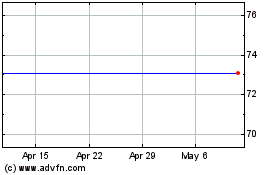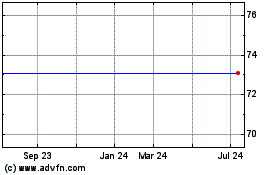By Heather Gillers and Gunjan Banerji
A larger-than-ever share of municipal bonds is being managed by
professionals, shaking up a market that has traditionally been the
domain of mom- and-pop investors.
The rapid expansion of muni money managers, under way for more
than a decade, reached a milestone in the past year: More than half
of the total amount of muni bonds held by households -- a third of
the $4 trillion market -- now sits in separately managed accounts
or mutual funds.
Investors in these separate accounts typically pay an annual
percentage to a portfolio manager tasked with buying and selling
bonds, rather than purchasing bonds from a brokerage account for a
one-time fee and holding them.
Separate accounts held about $600 billion in municipal debt at
the end of the first quarter, triple the amount in 2010, according
to Vikram Rai, head of municipal strategy at Citigroup Inc. In
addition, muni mutual funds, which are also overseen by a manager
but are pooled funds rather than individual accounts, held $739
billion, a 52% increase, during the same period, according to the
Federal Reserve.
The jump in such accounts comes as demand for munis is at nearly
unprecedented levels and could in some cases put mom-and-pop
investors at a disadvantage. Firms that manage munis can wield
their market power and bulk-buying capacity, and they can also size
up risk in a way many individual investors can't.
High-profile losses in Detroit and Puerto Rico left some
investors and financial advisers seeking the help of a credit
research team that typically comes with managed accounts. In
addition, separate accounts with more active management can help
wealthy investors further reduce taxes beyond the benefits munis
generally provide. Investors often turn to munis because their
interest is typically exempt from federal taxes.
As exchange-traded and mutual funds have slashed fees, bigger
shops have been able to invest more in technology, giving them an
edge against smaller players, analysts said.
Matt Witkos, president of Eaton Vance Distributors, who works
with financial advisers to offer strategies for separately managed
accounts, said high-quality bonds have become a hot commodity.
"Who's likely to get those bonds? An individual adviser, an
individual investor, or someone like Eaton Vance?"
The influx of cash into mutual funds and separate accounts has
made the muni market more concentrated in various areas.
The number of broker-dealers, the trading houses that buy and
sell bonds, has fallen by almost 40% to 776 since 2006, according
to Municipal Securities Rulemaking Board data. As they have closed
and consolidated, money managers such as BlackRock Inc. and Nuveen
LLC are playing a role as distributors, parceling out muni debt to
investors around the country following a bond sale.
According to Cerulli Associates, the three firms that manage the
most municipal debt in separate accounts -- BlackRock, Nuveen and
Eaton Vance -- have a combined $93 billion in separate accounts,
almost double their 2013 holdings. When mutual-fund and ETF
holdings are added in, those three money managers hold $176 billion
in munis.
"A lot of the activity now is happening on our side of the
street, our side of the wall," said Richard Taormina, head of tax
aware strategies at J.P. Morgan Asset Management. "It's been a big
evolution, and I don't think we're done yet."
Managers buying for separate muni accounts have an additional
advantage: They often qualify for what are known as retail order
periods created to give mom-and-pop bondholders an edge over mutual
funds, banks and insurance companies. Several large managers told
The Wall Street Journal that they put in bulk orders during those
periods and then distribute the bonds to individual accounts.
While big managers can flex their buying power, there are
drawbacks to actively managed separate accounts that aren't faced
by direct retail investors who tend to hold bonds to maturity. Some
managers including BlackRock have lowered investment thresholds to
$250,000 for actively managed separate accounts, but those smaller
investors can face high transaction costs if they want to
liquidate, analysts said.
Thornburg Investment Management limits its municipal-bond
separate accounts to $1 million. Otherwise "every time I sold 10
[bonds] to buy 10, I would crush any gains I had...even if it was
the best day ever to buy bonds," said portfolio manager Nicholos
Venditti.
Don Martin, a certified financial planner at Cupertino,
Calif.-based Mayflower Capital, said he cautions clients against
separate accounts for that reason.
"To avoid this cost, I recommend using a mutual fund," Mr.
Martin said.
Borrowers are taking notice of professional money managers'
increased clout.
Last month, Ben Watkins, director of Florida's Division of Bond
Finance, held a phone conference with Breckinridge Capital Advisors
to learn how he could help the firm market the state's bonds to
investors in its separate accounts. He now plans to increase
disclosure about how Florida is addressing climate-change risk.
"It was mostly broker-dealers that issuers talked to
historically when they were trying to figure out how to present
their debt to the market," Mr. Watkins said. Those dealers "still
perform that role but maybe professional investors are being a
little more outspoken in their needs and desires."
A BlackRock spokeswoman said that the firm's daily market
presence improves pricing and that it wouldn't sell bonds at a
price that managers didn't believe was appropriate. A Breckinridge
executive said that recent demand has driven down trading costs.
Mr. Witkos of Eaton Vance said through a spokeswoman that
separately managed accounts are a low-cost option for investors and
that the firm's "critical mass" helps land attractive prices for
investors when buying or selling.
Write to Heather Gillers at heather.gillers@wsj.com and Gunjan
Banerji at Gunjan.Banerji@wsj.com
(END) Dow Jones Newswires
October 09, 2019 10:08 ET (14:08 GMT)
Copyright (c) 2019 Dow Jones & Company, Inc.
Eaton Vance (NYSE:EV)
Historical Stock Chart
From Mar 2024 to Apr 2024

Eaton Vance (NYSE:EV)
Historical Stock Chart
From Apr 2023 to Apr 2024
